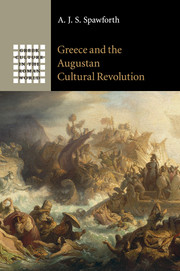Book contents
- Frontmatter
- Contents
- Illustrations
- Acknowledgments
- Chapter 1 Introduction
- Chapter 2 ‘Athenian eloquence and Spartan arms’
- Chapter 3 ‘The noblest actions of the Greeks’
- Chapter 4 ‘The gifts of the gods’
- Chapter 5 ‘Constructed beauty’
- Chapter 6 Hadrian and the legacy of Augustus
- Conclusion
- Bibliography
- Index
Conclusion
Published online by Cambridge University Press: 05 November 2011
- Frontmatter
- Contents
- Illustrations
- Acknowledgments
- Chapter 1 Introduction
- Chapter 2 ‘Athenian eloquence and Spartan arms’
- Chapter 3 ‘The noblest actions of the Greeks’
- Chapter 4 ‘The gifts of the gods’
- Chapter 5 ‘Constructed beauty’
- Chapter 6 Hadrian and the legacy of Augustus
- Conclusion
- Bibliography
- Index
Summary
This book has argued against any notion that Greece fell into a state of history-free limbo following imperial incorporation in 146/5 bc and entry into the longue durée of Roman rule. It argues for two exceptional turning points in Greek history under the principate: firstly under Augustus and secondly under Hadrian. Unusually, both these reigns were marked by wide-ranging imperial initiatives concerning the provincials. As regards the eastern Mediterranean, under both emperors the imperial state publicly defined a Hellenism suitable for Roman usage and (therefore) for incorporation into official ‘Roman’ identity. Augustus was reacting to various pressures and debates at the dawn of the imperial monarchy: anxiety about Roman decadence, defined in part by concerns over gender roles gone awry; anti-Asian sentiment, nurtured by Octavian but already present in Roman thought; the political need to ‘sell’ the principate to a provincial audience. What began under Augustus was a new process whereby Rome, in Ando's words, ‘supplied the initial articulation of the values to which residents of the empire orientated themselves as members of its community’. Augustus sought to identify values which he and his circle thought of as central to what it was to be Roman. Where Greek culture was concerned, an ‘imperial style of signalled incorporation’ made clear the ‘pure’ brand of Hellenism that the ruling power sought to uphold as morally acceptable to Romans. Essentially this was the ideal of Graecia vera. The moral advantages of this ideal from a Roman viewpoint were that it consigned Greece's admirable achievement to a distant, and therefore unthreatening because irrecoverable, past; and it firmly disconnected this ancient achievement geographically from Asia by rooting it in the more virile soil of Europe, where nature and climate had once supported even a Greek martial spirit, as emblematised by the Sparta of old and by spectacular Greek victories over eastern barbarians. This cultural lineage aimed at conferring a new respectability on Hellenism: on making it ‘Roman’, in effect, so that the Greek humanitas which imperial Rome claimed to champion and with which members of its ruling elite identified, to judge from Pliny and Tacitus, could be seen as compatible with mos.
- Type
- Chapter
- Information
- Greece and the Augustan Cultural Revolution , pp. 271 - 274Publisher: Cambridge University PressPrint publication year: 2011



